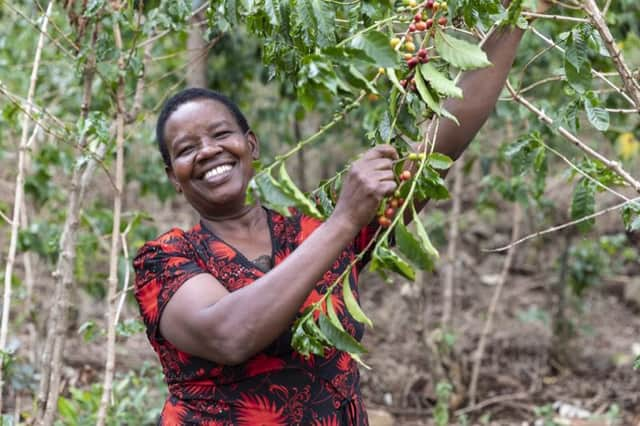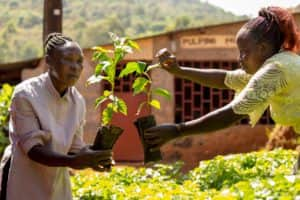'The fight against climate change is about human rights' - Fairtrade's call to hear farmers


Fairtrade is highlighting the challenges facing farmers living with the impact of the climate crisis.
The coffee farmers of Kenya may seem a long way from our daily lives but here’s a wake-up call with more kick than a double espresso.
By 2050, up to half the world’s land that’s currently used to farm coffee may not be viable, according to the Fairtrade Foundation.
Advertisement
Hide AdAdvertisement
Hide AdAnd that’s just one of the crops amid the many facing the dire impact of the climate crisis.
Fairtrade is leading a rallying cry to listen to those at the sharp end of the climate emergency.
The movement has launched a three-year global climate campaign across Kenya, the UK and the US, partnering with Fairtrade producers, businesses and consumers to call on world leaders to listen to the expertise of farmers and workers who grow our food.
Be Fair with Your Climate Promise
The campaign, ‘Be Fair with Your Climate Promise’, highlights how much is at stake for those who produce much of our food and who live with the harmful reality of the climate emergency.
Advertisement
Hide AdAdvertisement
Hide AdIn Africa, for instance, temperatures are rising more rapidly than the global average, with extreme weather events and more frequent rainfall now expected across the continent, jeopardising the viability of crops.
A recently published Fairtrade paper cautions that there are big differences in what people can afford to do to protect themselves and adapt to climate change, depending on the social, economic and political conditions in which they live.
“Farming communities who have cared for their local ecosystems for generations know exactly why the climate crisis really is a crisis,” said Kate Nkatha, Fairtrade Africa’s commercial director.
“Yet millions are unable to earn enough to adapt to real threats climate change poses for lives and livelihoods. The fight against climate change is about human rights and ensuring justice for vulnerable communities impacted.
Advertisement
Hide AdAdvertisement
Hide Ad“Paying a fair price to the farming communities will support their climate adaptation and mitigation interventions for a sustainable future.”


Why clamping down on global emissions matters to us all
According to Fairtrade, while the world’s wealthiest 10 percent are responsible for half of global emissions, it is those earning the least in lower income countries who are being forced into extreme hardship by climate change.
And it warns that we will all suffer unless we clamp down hard on global emissions.
During the first year of the campaign, leaders of richer nations are being urged to keep their promise to provide at least $100bn in annual climate finance for lower income nations on the frontline of the climate crisis.
Advertisement
Hide AdAdvertisement
Hide AdFairtrade says these funds need to reach farmers so they can invest in ways to adapt to the widespread effects of a changing climate, including investing in low-carbon farming methods.
The campaign will generate a collective cry to global leaders from Fairtrade supporters, businesses and farmers for these investments to be made.
It has already mobilised Fairtrade supporters to write to their MPs and legislators to demand they back a fair climate promise.
Fairtrade Standards encourage producers to protect the environment by improving soil, planting trees, conserving water and avoiding pesticides, while its programmes include climate academies for farmers to share best practice.
Advertisement
Hide AdAdvertisement
Hide AdThe organisation also makes training available to producers so they can use the latest agricultural methods to adapt to conditions.
In the coffee-growing regions of East Africa, the weather has changed dramatically in recent times.
The seasons have become unpredictable and making a living from agriculture is tough when droughts, floods and extreme heat destroy crops.
The farmers are just about surviving, but there is no money left over to invest in anything that would help protect from these shocks.
Advertisement
Hide AdAdvertisement
Hide AdFairtrade’s Climate Academy was created to bring farmers together to share ways of adapting to climate change, find new opportunities to earn money, and make their farms more able to withstand extreme events.
In Kenya, Fairtrade coffee farmer Judy Ruto, from the Kipkelion co-operative, is feeling energised to take action to keep the household fed using her experience of the Climate Academy.
“Around us we see fields where the young maize has already dried out,” she said. “Even if it starts raining soon, the harvest is ruined. Maize is our staple food crop and for many families a failed maize harvest means real hunger.
“Luckily with the help of the co-operative and the Climate Academy we are better prepared for these types of conditions.”
To find out how you can join Fairtrade’s climate justice campaign visit http://fairtrade.org.uk/be-fair